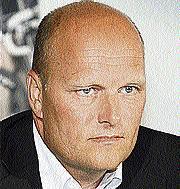
Bjarne Riis, owner of Danish-based cycling team Team CSC and winner of the Tour de France 1996, speaks during a news conference in Lyngby near Copenhagen yesterday. Riis became the first rider to admit having used performance enhancing drugs while winning the Tour de France. - Reuters
COPENHAGEN (Reuters):
DANE BJARNE Riis, yesterday, becamethe first rider to admit having used performance-enhancing drugs while winning the Tour de France.
Riis, who won the race in 1996, said he used drugs between 1993 and 1998.
"I have taken doping, I have taken EPO," Riis told a news conference. "I purchased it myself and I took it myself. It was a part of everyday life as a rider."
Previously, Riis had denied using the blood-boosting substance erythropoietin (EPO).
"I'm proud of my results even though they were not completely honest," he said. "I'm coming out today to secure the right future for the sport."
He went on to allege that former Telekom boss, Walter Godefroot, turned a blind eye to the drug use in the team.
Pat McQuaid, president of the Union Cycliste Internationale (UCI) governing body, said Riis would not be stripped of his Tour de France title.
"The eight-year statute of limitations has expired," McQuaid told German sports news agency SID. "We're not going to rewrite the history now."
Riis is now the sporting director of cycling team CSC, which last year parted ways with Giro d'Italia winner, Ivan Basso, when Basso was implicated in a Spanish police probe into blood doping by a group of doctors in Madrid.
No tests
Germans Erik Zabel and Rolf Aldag, who rode for Telekom when team leaders Riis and German Jan Ullrich won the Tour de France in 1996 and 1997, respectively, admitted on Thursday to using EPO in the mid-1990s. No test for EPO existed until 2000. Ullrich retired from racing last month and has previously denied using illegal substances.
"I have no proof that Jan doped," Riis said. "When I used doping, I did it on my own and never together with Jan Ullrich. It doesn't matter to me if he used doping or not. Ask him directly yourself. And it's not up to me to say if he doped or not."
Last year's Tour de France winner, Floyd Landis, is battling the U.S. Anti-Doping Agency in court in an attempt to keep his title after his urine tests proved positive for a synthetic form of the male hormone testosterone.
Tour de France director Christian Prudhomme was not reachable by telephone to discuss Riis's admission.
Stone-faced and at times with tears swelling up in his eyes, Riis said he had always regretted using performance-enhancing drugs.
"It's possible that I'm not a hero anymore," he said. "I'm sorry if I've disappointed people. And for those for whom I was a hero, I'm sorry. They'll have to find new heroes now."

